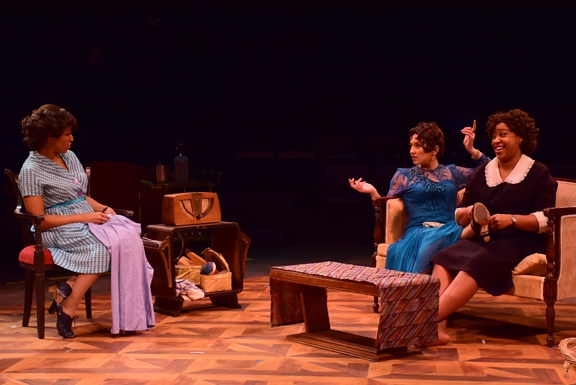KALAMAZOO – In the theater, timing is everything, and it’s difficult to imagine a better week than this one for the Kalamazoo Civic to open “By the Way, Meet Vera Stark,” Lynn Nottage’s bittersweet look at the so-called golden age of Hollywood, when African-American actors frequently found themselves with two kinds of parts to choose from: shuffling slaves down on the old plantation, or dutiful servants in the plush homes of white bosses.
Coming immediately after Pepsi was forced to pull a jaw-droppingly stupid spot in which rich, white model Kendall Jenner became the focal point of a mock Black Lives Matter protest march, “Vera” reminds us that, when dealing with portraying the black experience in mainstream entertainment, we continue to wrestle with many of the same prickly issues that have been around since the first movies hit the silver screen.
The show is as imperfect as it is insightful. Nottage’s scalding observations about the “good old days” when some light-skinned African-Americans (the cringe-worthy term in those days was “high yellow”) used makeup and hair gels to “pass” for white – or, in the case of would-be star Anna Mae (vivacious Erika Rasmussen, making an auspicious Civic debut) in “Vera,” Brazilian – don’t always mix smoothly with the broad, crowd-pleasing, undeniably funny comedy that dominates much of the first act.
There are bumpy patches in the second act as well, as long-suppressed secrets threaten to erupt in public. But the inconsistencies in the script are relatively easy to set aside because when “Vera” hits its targets (and it does, quite frequently) the audience feels the shockwave. This is a production that should inspire some fascinating drive-home discussions.
At its core are two incisive performances from a pair of actresses unafraid of going for broke. Marissa Harrington gives a tour-de-force portrayal of Vera Stark, a Depression-era maid with dreams of breaking into film. She works for Gloria Mitchell (the equally striking Stefani Bishop), a stylish, brassy leading lady of the Carole Lombard/Irene Dunne/Jean Arthur school, who detests her studio-crafted image as “America’s Sweetie Pie” as much as she delights in the money and fame it has brought her. Only much later will we learn the true nature of Vera and Gloria’s sometimes contentious relationship.
The first half details Gloria and Vera’s struggles to land roles in “The Belle of New Orleans,” a romance about a beautiful “octoroon” bordello girl who marries into wealth in the pre-Civil War South, but keeps her loyal maid by her side (no prizes for guessing who gets what part) as she faces a terminal disease. “Why the hell are we still playing slaves?” asks Leroy Barksdale (Brandon Newson), Vera’s suitor. “It was hard enough to get free the first time.” Vera, however, thinks she can bring real personality and emotional truth to the underwritten character, and she’s willing to stop at nothing to get the attention and approval of director Maxmillian Von Oster (Lars J. Loofboro). The scheming pays off in a big way.
The second act jumps to the present day, when Vera’s legacy is being dissected and debated by a trio of self-important talking heads, who fire buzzwords and trendy phrases at each other while they look at footage of Vera’s final public appearance, on a Merv Griffin-like talk show in 1973. Vera, so sensible, down-to-earth and amiable in her early days, has turned into a sassy, wise-cracking, defensive diva hiding behind oversized sunglasses and chic designer dresses; imagine Pearl Bailey infused with a sizable dose of mid-1990s Whitney Houston.
A surprise encounter with someone from her past shatters Vera’s façade, and 40 years of recriminations, squelched fury and old-fashioned jealousy saturate the stage.
The material shares a certain degree of common ground with Alice Childress’ ground-breaking drama “Trouble in Mind,” in which African-American actresses in the mid-1950s share some bitter laughs about building their careers on playing cheerful domestics named for various jewels and “every flower in the garden.” “White folks can’t stand unhappy Negroes, so laugh,” one of the veteran performers advises in “Trouble.” Similarly, studio head Slasvick (Guy Hauke) decrees, “Slavery ain’t exactly a pick-me-up. If you’re gonna give ‘em slaves, make ‘em happy ones.”
Although “Vera” is not as sturdy a play as Childress’, director Emily Campbell Berezowsky and her cast drive home the script’s sharpest moments, both the humorous and the heartbreaking ones. The chemistry between Harrington and Bishop is potent throughout. As Lottie, Vera’s roommate and fellow wannabe star, Charlotte A. Thomas gets a scene that would have made Lucille Ball proud as she demonstrates how she played Juliet’s death scene (she milks it so magnificently that the stage hands literally have to carry her off). Loofboro is terrific as a spaced-out rocker who flirts with Vera in the second act, and Hauke captures the cheesy charm of a ‘70s daytime TV personality as the vapid but determinedly upbeat Brad Donovan.
It’s exciting and encouraging to see the Civic take a chance on a relatively new work like this, and if “Vera” is not a flawless show, it’s certainly a worthwhile and challenging one. In fact, somebody should book seats for Pepsi’s board of directors right away.





